外研版八上英语Module 10Unit 1
外研版八年级英语上册Module 10 Unit1课件

-5℃ ~ 1℃
10℃ ~ 21℃ √ 17℃ ~ 20℃ √
Weather
√
√
√
√
√
√
√
Listening and vocabulary
3. Work in pairs. Correct the wrong information in the table.
City Beijing Shanghai Xi’an Guangzhou Hong Kong
Listening and vocabulary
2. Listen and check(√)the correct information in the table.
City Beijing Shanghai Xi’an Guangzhou Hong Kong
Temperature
-8℃ ~ -2℃ √
She told us some very funny jokes.
joke 的常用搭配:
Tommy’s uncle often jokes with him. joke with sb. 和某人开玩笑
He played a joke on his sister.
play a joke on sb. 戏弄某人
The doctor took his temperature and gave him some medicine. 常用短语:
have a temperature= have a fever 发烧; take one’s temperature 量某人的体温。 询问温度是多少时不能用how much 或how many, 用 “What’s the temperature...?”, 答语用“It’s between... and..”。
八年级英语上册Module1HowtolearnEnglishUnit1Let’strytospeakEnglishasmuchaspossible教案(新版)外研版

Module 1 How to learn EnglishUnit 1 Let’s try to speak English as much as possible.Learning Objectives:After class, Students can1.Understand and master instruction words in cl ass and respond while hearing them.2.Maste r key phrases/expressi ons and their usage.Important teaching point:1. Instruction words in class; 2.set phrases.Difficult teaching point:“practice doing .., match…with…, make mistakes (in)…, try to do …,etc.”Teaching Aids:Multimedia, blackboardTeaching ProcedureStep One Lead-inCheck the words and expressions on P137.(pair----understand)Step Two group workAsk students to read the instruction words in Activity 1 and understand themStep Three Guessing workT presents some pictures and ask students to guess what instructions they are.Step Four Discussion (Group work)T asks students to discuss the other instruction words we have learned. Then students answ er them.Step Five Activity 2T presents some questio ns and asks students to listen and answe r them.Step Six Key points1.T plays the tape about three conversations, students listen and answer them.2.T asks students to f ind out key points.3.T explains key points , students take notes and make sentences about them.Step Seven QuizStep Eight Homework。
2022年外研版八年级上册《Module 10 Unit1》公开课教案
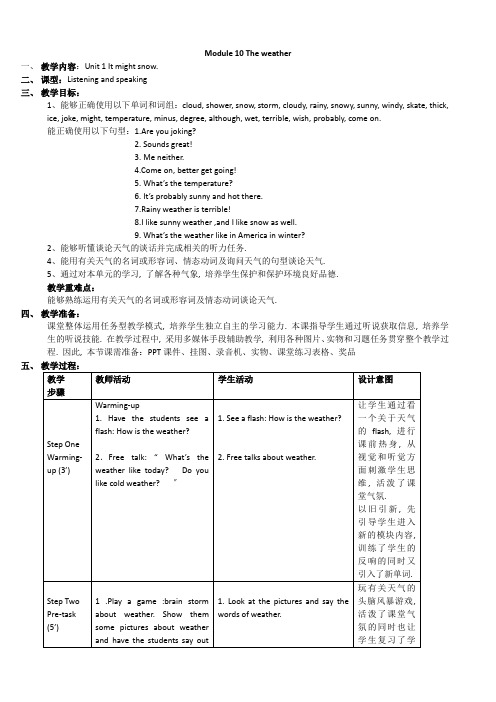
Module 10 The weather一、教学内容:Unit 1 It might snow.二、课型:Listening and speaking三、教学目标:1、能够正确使用以下单词和词组:cloud, shower, snow, storm, cloudy, rainy, snowy, sunny, windy, skate, thick,ice, joke, might, temperature, minus, degree, although, wet, terrible, wish, probably, come on.能正确使用以下句型:1.Are you joking?2. Sounds great!3. Me neither.e on, better get going!5. What’s the temperature?6. It’s probably sunny and hot there.7.Rainy weather is terrible!8.I like sunny weather ,and I like snow as well.9. W hat’s the weather like in America in winter?2、能够听懂谈论天气的谈话并完成相关的听力任务.4、能用有关天气的名词或形容词、情态动词及询问天气的句型谈论天气.5、通过对本单元的学习, 了解各种气象, 培养学生保护和保护环境良好品德.教学重难点:能够熟练运用有关天气的名词或形容词及情态动词谈论天气.四、教学准备:课堂整体运用任务型教学模式, 培养学生独立自主的学习能力. 本课指导学生通过听说获取信息, 培养学生的听说技能. 在教学过程中, 采用多媒体手段辅助教学, 利用各种图片、实物和习题任务贯穿整个教学过程. 因此, 本节课需准备:PPT课件、挂图、录音机、实物、课堂练习表格、奖品五、七、板书设计:Module10 The weatherUnit1 It might snow.1.Are you joking?2. Sounds great!3. Me neither.e on, better get going!5. What’s the temperature?6. It’s probably sunny and hot there.7.Rainy weather is terrible!8.I like sunny weather ,and I like snow as well.9. What’s the we ather like in America in winter?达标训练题一、根据句子意思, 用适当的词填空:1) It rains a lot in summer in Beijing. It’s often ________.2) There’re a lot of clouds. It’s _________.3) The weather is snowy and there’s a lot of __________ in the park.4) The sun is out. It’s very ____________ and hot today.5) The wind is very strong. It’s so __________ that it’s difficult to walk.二、选择正确的答案:( ) 1. - ________? It’s cold.A. What’s the weatherB.What’s the weather likeC. How’s weatherD. How’s the weather like( ) 2. - I don’t like rainy weather. -________.A. I don’t like, too.B. Are you joking?C. Me neither.D. Sounds great!( ) 3. It’s very cold and cloudy. It might _____tomorrow.A. snowB. snowedC. snowyD. snowing( )4. — Where are you going this weekend? .—I’m not sure. I ______go to the zoo.A. canB. mayC. needD. must( )5. She likes red and green _______.A. alsoB. eitherC. neitherD. as wellUnit 1 While the lights were changing to red,a car suddenly appeared.教学目标【知识目标】1、能掌握本单元的单词和短语:bite, climb, hide, throw, fridge, pain, worse, medicine.2. 掌握本单元中的常用句型.【能力目标】1、能根据图片预测下文;能理解作者通过故事要传达的信息;能够理解语篇中故事发生的顺序.2、能够仿照范文, 用过去进行时对发生在周围的事故进行描述或报道.【情感态度目标】学习遇到突发事件时应沉着冷静, 尽量想方法自救的平安意识.教学重难点【教学重点】过去进行时, when和while引导的时间状语从句.【教学难点】能运用过去进行时就意外事故这一话题进行讨论.教学过程Step 1 Lead-inSs look the pictures and fill in the blanks.Step 2 Consolidate new wordsLook and say. The teacher shows the pictures of new words and let the students to say the new words as quickly as possible.Step 3 Say the meaning of the phrases.Work in pairs. Let Ss say the meaning of the phrases as quickly as possible.Step 4 Look at the pictures and say what’s happeningLook at the picture and use the words from the box to say what’s happening at that time.Step 5 Listen to Activity 2 and read1. The driver was/was not going fast.2. The driver was/was not looking.3. The driver was/was not talking on his mobile phone.Step 6 Listen to the dialogue and answer the questionsLet Ss listen to the dialogue and answer the two questions. Then check in groups.Step 7 Read the dialogue and answer the questions1. What was the boy doing when he was riding his bike?2. When did a car suddenly appear round the corner?3. Did the boy fall off his bike?Step 8 Read Activity 3 and complete the following advice.When you are riding a bike, think about the risk of an accident!Pay ___________ and stop at the___________.Don’t ______ too fast.Don’t ride ____________ with your friends.Don’t ______________!Step 9 Complete the passage with the correct form of the words from the box.Let Ss read the passage first and choose the words and expressions from the box.Step 10 Everyday EnglishAre you all right? That’s very dangerous!That’s too bad.Anything else?Step 11 Language pointsLet Ss master the main points of the passage.Step 12 Listen and mark when the speaker pauses1. Listen and mark when the speaker pauses.1) While the lights were changing to red, a car suddenly appeared round the corner.2) When I was waiting to cross the road, the accident happened.2. Now listen again and repeat.Step 13 Work in groups of fourStudent A: You’re a policeman at an accide nt scene in the street. Ask people questions.Student B, C and D: You saw the accident. Answer the policeman’s questionsStep 14 Grammer掌握过去进行时的用法.Step 15 Summary重点短语in time fall off pay attention side by side 过去进行时Step 16 ExercisesDo some exercises about the main points.Step 17 中考链接Do the exercises in the entrance exam to senior high schools. 课堂作业编写一个对话,介绍你亲眼目睹的一次交通事故.教学反思。
外研版八年级英语上册Module1-Unit1完整ppt课件
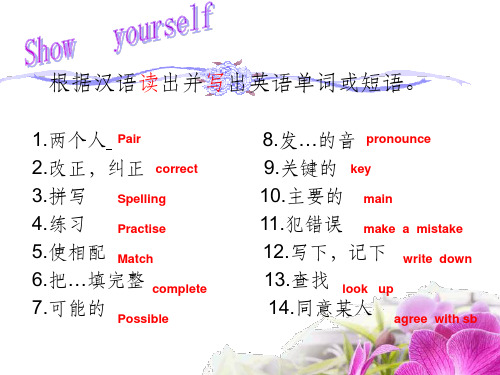
5.Match the words with their meaning.
plete the sentences with the words in the
box.
.
4
1.Read the Dialogue in groups 2.Translate the Dialogue in groups
2. 为什么你们不完成家庭作业?
Why don’t you finish your homework?
3.为什么不在公园里散步?(take a walk)
Why not take a walk in the park?
.
10
Practice
1.听收音机怎么样?
How /What about listening to the radio? 2. 步行去学校怎么样?
agree with sb
Hale Waihona Puke .1Module 1 How to learn English
Unit 1 Let’s try to speak English as much as possible
讲课人:程琳
.
2
1、会翻译主要对话 2、学会运用提建议的句型 3、通过学习提出建议,掌握与他人交流时
语言的得体性
根据汉语读出并写出英语单词或短语。
1.两个人 Pair
2.改正,纠正 correct
3.拼写 Spelling
4.练习 Practise 5.使相配 Match 6.把…填完整 complete 7.可能的
Possible
8.发…的音 pronounce
9.关键的 key
10.主要的 main
11.犯错误 make a mistake 12.写下,记下 write down 13.查找 look up 14.同意某人
外研版八年级英语上全册课文翻译

外研版八年级英语上全册课文翻译Module 1怎样学英语Unit 1让我们尽可能多的讲英语詹姆斯老师:同学们,欢迎回来!今天,我们打算谈论一下学习英语的好方法。
准备好了吗?谁有一些建议?玲玲:在课堂上我们应该总是讲英语。
詹姆斯老师:好!让我们尽可能多地讲英语。
大明:为什么不在我们笔记本上记下我们的错误呢?詹姆斯老师:那是个好主意,而且不要忘记在错误旁边写下正确的答案,还有什么其它的建议?玲玲:每天拼写并大声朗读新单词是个好主意。
詹姆斯老师:非常感谢,玲玲,听广播怎么样?大明:是的,那也有益于我们的发音。
但有很多生词。
詹姆斯老师:你(们)不必理解每个单词(的含义)。
你(们)只需要听关键词和主要意思。
大明:阅读也一样。
英语故事很有趣。
通过阅读我逐渐了解了世界上的许多事情。
玲玲:我认为写作也很重要。
我们为什么不尽量去找些英语笔友呢?我们可以给他们写信。
詹姆斯老师:太棒了!我同意你的提议。
U nit 2你应该向她微笑把你的问题发送给语言博士黛安娜。
很多学生请求给予如何提高他们的英语水平的建议。
这儿是三个基本问题。
第一个问是关于(如何)理解英文电影和歌曲。
来自湖北的李浩写道:我喜欢看英文电影和听英文歌曲,但我理解的不多。
我该怎么办呢?看电影和听歌曲是学习英语很好的方式!看和听几遍,并猜测生词的含义。
每一遍你都会学到新东西。
我还建议你和朋友们谈论一下这些电影或歌曲。
第二个问题是关于口语的。
来自吉林的王帆写道:“我们学校有一位来自美国的老师。
我很腼腆,不敢与她说话。
我该怎么办?”你可以说:“嗨!你好吗?”“你喜欢中国吗”这些都是展开交谈的好方式。
在你开始(讲英语)前,你应该向她微笑!记住这一点:不要害羞,去试一试。
第三个问题是关于词汇的。
来自安徽的张雷写道:我写下生词,但我很快就忘记了,我怎样才能记住它们呢?不用担心,忘记生词是很自然的!我建议你每天把四五个单词写在纸片上并放在你的房间里。
看到这些单词的时候就读一读,并且尽量使用它们。
外研版八年级英语上册Unit 1

neither terrible
wish probably come on
adv.(某人或某物)也不 adj.使人烦恼的;可怕的 v.但愿;希望 adv.或许;可能 快点
minus
degree (s)
temperature
What’s the temperature?
20℃
tweIntt’ys…degrees
cold cool hot
hot
freezing wram war
m cool
cold
freezing
2 Listen
City Temperature
and check
Beijing -8 ~-2ºc
(√) the correct
Shanghai
5~9ºc
informa -tion
Xቤተ መጻሕፍቲ ባይዱ’an
–1~14ºc
2. What’s the weather like in Beijing now? It is very cold.
3. Does Tony like showers and windy weather? No, he doesn’t.
4 Listen and read.
Betty: Hey, boys! Tony: Hi, Betty. Hi, Lingling. Where are you going? Betty: We’re going to the park to skate. There’s
like snow as well. But I don’t like
我也不喜欢。
Betty: Me neither. Rainy weather is
terrible!
新 外研版英语八年级上册Module 10 Unit1 (2)配套练习(附答案)
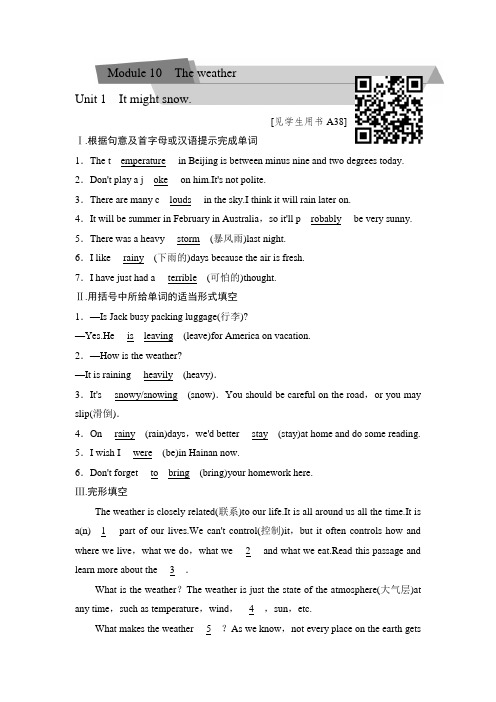
Module 10The weatherUnit 1It might snow.[见学生用书A38]Ⅰ.根据句意及首字母或汉语提示完成单词1.The t__emperature__ in Beijing is between minus nine and two degrees today. 2.Don't play a j__oke__ on him.It's not polite.3.There are many c__louds__ in the sky.I think it will rain later on.4.It will be summer in February in Australia,so it'll p__robably__ be very sunny. 5.There was a heavy __storm__(暴风雨)last night.6.I like __rainy__(下雨的)days because the air is fresh.7.I have just had a __terrible__(可怕的)thought.Ⅱ.用括号中所给单词的适当形式填空1.—Is Jack busy packing luggage(行李)?—Yes.He __is__leaving__(leave)for America on vacation.2.—How is the weather?—It is raining __heavily__(heavy).3.It's __snowy/snowing__(snow).You should be careful on the road,or you may slip(滑倒).4.On __rainy__(rain)days,we'd better __stay__(stay)at home and do some reading. 5.I wish I __were__(be)in Hainan now.6.Don't forget __to__bring__(bring)your homework here.Ⅲ.完形填空The weather is closely related(联系)to our life.It is all around us all the time.It is a(n)__1__ part of our lives.We can't control(控制)it,but it often controls how and where we live,what we do,what we __2__ and what we eat.Read this passage and learn more about the __3__.What is the weather?The weather is just the state of the atmosphere(大气层)at any time,such as temperature,wind,__4__,sun,etc.What makes the weather __5__?As we know,not every place on the earth getsthe same amount of __6__.Some places get more sunlight.So it's __7__ in those places.Some places get little or no sunlight in __8__.Then those places have lower temperatures in winter.These __9__ in temperature make the air and water move around the __10__.The movement helps to __11__ the heat energy from the sun across the earth.So the weather changes.What's the difference between weather and climate(气候)?Climate is a place's weather over a __12__ time.The weather changes from day to day and __13__ from hour to hour.It can be sunny in the morning,__14__ cold and wet in the afternoon.As for the climate,it changes very __15__ over lots of years.(A)1.A.important B.interestingC.helpful D.useful(A)2.A.wear B.hearC.like D.read(D)3.A.seasons B.lifeC.customs D.weather(B)4.A.water B.rainC.plants D.animals(B)5.A.return B.changeC.rise D.drop(C)6.A.rain B.snowC.sunlight D.moonlight(B)7.A.nicer B.warmerC.heavier D.richer(A)8.A.winter B.autumnC.summer D.spring(D)9.A.advantages B.changesC.movements D.differences(A)10.A.earth B.mountainsC.sun D.oceans(D)11.A.reach B.fetchC.blow D.take(C)12.A.good B.hardC.long D.short(D)13.A.also B.almostC.just D.even(D)14.A.so B.becauseC.as D.but(B)15.A.differently B.slowlyC.carefully D.easilyⅣ.阅读理解Maybe you know floods,earthquakes,sandstorms and so on.But have you heard of typhoons(台风)?Typhoons are some of the worst storms,usually around the Pacific Ocean and the South China Sea.Most of them happen in July,August and September.How does a typhoon happen?When lots of sea water gets hot in the summer sun,it evaporates(蒸发)into the air.This makes the air hotter.When the air gets warm enough,it starts to move higher up into the sky.After the air gets warmer,it starts to move quickly,making wind.The wind goes in circles and it keeps moving higher in the sky.The warmer the air gets,the quicker the wind moves.And when the wind moves faster than 32.7 metres a second,a typhoon begins.A typhoon has two parts.One is called the “eye”.In the eye,the wind does not move so fast.The other part is the wall of clouds around the eye.Here are the strongest winds and hardest rain.Typhoons are very dangerous.In November,2013,Typhoon Haiyan killed more than 5,500 people in Philippines(菲律宾).Many people went missing.What to do when a typhoon hits?☆Stay inside.Close all the windows and stay away from them.☆Try to bring all of your things inside.Strong winds can even blow away your bikes.☆Listen to the radio or watch TV for important information.(D)1.This passage is most probably from________.A.an advertisementB.a travel recordC.a weather reportD.a science magazine(A)2.Typhoons often happen________.A.in the hot seasonB.in the cold seasonC.only in ChinaD.under the sea(D)3.In which order does a typhoon happen?①The wind moves fast enough and then a typhoon starts.②The air moves quickly,making wind.③The sun makes sea water hot.④The air gets warmer.A.②③①④B.③①④②C.①③④②D.③④②①(C)4.Which of the following is TRUE according to the passage?A.The warmer the air gets,the slower the wind moves.B.About 7,100 people died because of Typhoon Haiyan in Philippines. C.The strongest winds and hardest rain are in the wall of clouds.D.A typhoon will not happen before the wind goes faster than 40 km a second. Ⅴ.词汇运用A.用方框中所给单词的适当形式填空。
英语八年级上册外研版课文翻译

英语八年级上册外研版课文翻译Module 1 怎样学英语Unit 1 让我们尽可能多的讲英语詹姆斯老师:同学们,欢迎回来!今天,我们打算谈论一下学习英语的好方法。
准备好了吗?谁有一些建议?玲玲:在课堂上我们应该总是讲英语。
詹姆斯老师:好!让我们尽可能多地讲英语。
大明:为什么不在我们笔记本上记下我们的错误呢?詹姆斯老师:那是个好主意,而且不要忘记在错误旁边写下正确的答案,还有什么其它的建议?玲玲:每天拼写并大声朗读新单词是个好主意。
詹姆斯老师:非常感谢,玲玲,听广播怎么样?大明:是的,那也有益于我们的发音。
但有很多生词。
詹姆斯老师:你(们)不必理解每个单词(的含义)。
你(们)只需要听关键词和主要意思。
大明:阅读也一样。
英语故事很有趣。
通过阅读我逐渐了解了世界上的许多事情。
玲玲:我认为写作也很重要。
我们为什么不尽量去找些英语笔友呢?我们可以给他们写信。
詹姆斯老师:太棒了!我同意你的提议。
Unit 2 你应该向她微笑把你的问题发送给语言博士黛安娜。
很多学生请求给予如何提高他们的英语水平的建议。
这儿是三个基本问题。
第一个问是关于(如何)理解英文电影和歌曲。
来自湖北的李浩写道:我喜欢看英文电影和听英文歌曲,但我理解的不多。
我该怎么办呢?看电影和听歌曲是学习英语很好的方式!看和听几遍,并猜测生词的含义。
每一遍你都会学到新东西。
我还建议你和朋友们谈论一下这些电影或歌曲。
第二个问题是关于口语的。
来自吉林的王帆写道:“我们学校有一位来自美国的老师。
我很腼腆,不敢与她说话。
我该怎么办?”你可以说:“嗨!你好吗?”“你喜欢中国吗”这些都是展开交谈的好方式。
在你开始(讲英语)前,你应该向她微笑!记住这一点:不要害羞,去试一试。
第三个问题是关于词汇的。
来自安徽的张雷写道:我写下生词,但我很快就忘记了,我怎样才能记住它们呢?不用担心,忘记生词是很自然的!我建议你每天把四五个单词写在纸片上并放在你的房间里。
看到这些单词的时候就读一读,并且尽量使用它们。
外研版英语八年级上册Module-1单元知识点归纳总结(详细版)

Module1 How to learn EnglishUnit1 Let’s try to speak English as much as possible.1.Welcome back!Welcome back to school!Welcome to China/our school/my home town! Welcome home!You’re welcome.give sb. a cold/warm welcome*注意welcome的词性v. adj n.2.talk with/to sb. about sth.have a talk/conversation with sb.3. ask for some advicea piece of advice注意advice是不可数名词,不能说these advicegive sb. advice给某人建议take/follow one’s advice听从某人的建议;4. speak English in classspeak English as much as possibleread books as many as you canas…as possible = as…as one can/could 5. write down our mistakes in our notebooks write it/them down (代词宾格只能放中间)类似结构还有pick up, take off, put on, turn on, turn off, turn down, turn up6. forget/ remember to do sth.记得、忘记要做某事(还没做)·forget/remember doing sth. 记得、忘记做过某事(已经做了)eg: Don’t forget to bring your photos here when you come.I remember seeing him somewhere in Jiaxing. 我记得在嘉兴的某个地方见过他。
外研版英语八上10模单词表

外研版英语八上10模单词表英文回答:Unit 10 Vocabulary.Part 1: Words in Context.1. The students were eager to learn about the new topic.2. The company has a reputation for being reliable and efficient.3. The scientists made a breakthrough in their research.4. The weather forecast predicts a downpour this afternoon.5. The city is located at the confluence of two major rivers.6. The new product was a flop.7. The students were assigned a project.8. The teacher disapproved of the student's behavior.9. The government is trying to tackle the problem of poverty.10. The company's profits have soared.Part 2: Word Forms.1. Eager (adjective) -> Eagerly (adverb)。
2. Reputation (noun) -> Reputable (adjective)。
3. Breakthrough (noun) -> Breakthrough (verb)。
4. Downpour (noun) -> Downpour (verb)。
5. Confluence (noun) -> Confluent (adjective)。
外研版英语八年级上册Module 1单元知识点归纳总结(详细版)
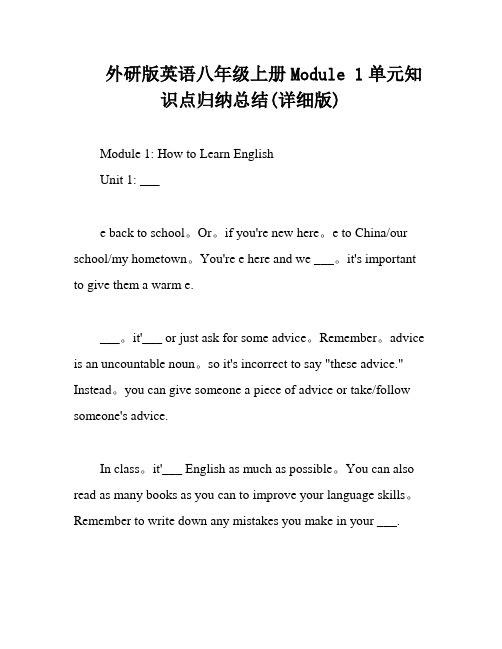
外研版英语八年级上册Module 1单元知识点归纳总结(详细版)Module 1: How to Learn EnglishUnit 1: ___e back to school。
Or。
if you're new here。
e to China/our school/my hometown。
You're e here and we ___。
it's important to give them a warm e.___。
it'___ or just ask for some advice。
Remember。
advice is an uncountable noun。
so it's incorrect to say "these advice." Instead。
you can give someone a piece of advice or take/follow someone's advice.In class。
it'___ English as much as possible。
You can also read as many books as you can to improve your language skills。
Remember to write down any mistakes you make in your ___.Lastly。
it'___'ve done in the past。
For example。
don't et to bring your photos when you come here。
And if you have a etful memory。
you may need to write things down to remember them。
Overall。
外研版八年级上Module1课文带译文

MODULE 1 How to learn English模块1怎样学英语Unit 1Try not to tran slateevery word.第一单元不要试图翻译每个单词。
Ms James:Welcome back,every one! Now, becauseit's a new term, I'm goi ng to give you someadvice. 詹姆士女士:欢迎大家回来。
现在,因为是一个新学期,我打算给你们提一些建议。
Why don't you write itdow n? Ready?把它记录下来好吗?准备好了吗?AII:Yes, Ms James.所有人:是的,詹姆士女士。
Ms James:You shouldalways speak En glish in class.詹姆士女士:你们在课堂上应该一直说英语。
And you should writedow n your mistakes iny our no tebooks.把你们的错误写在你们的笔记本上。
And why don't you writedow n the correctspelli ng and grammar next to the mistakes?What else?为什么不把正确的拼写和语法写在那些错误旁边呢?还有别的什么吗?Lin gli ng:lt's a goodidea to check yourvocabulary no tebookevery day.玲玲:每天检查词汇笔记本是一个好想法。
Ms James:That's a goodidea. Thanks a lot,L in gli ng.詹姆士女士:这是一个好主意。
谢谢你,玲玲。
How about liste ning tothe radio or readi ng an ewspaper in En glish?But try not to tran slateevery word. 听听英语广播节目或者看看英文报纸怎么样?不过不要试图翻译每个单词。
外研版八年级英语上册学案:module10theweatherunit1
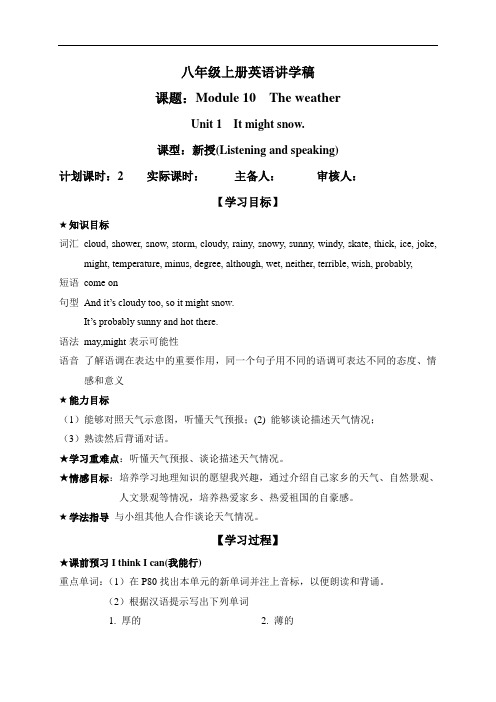
八年级上册英语讲学稿课题:Module 10 The weatherUnit 1 It might snow.课型:新授(Listening and speaking)计划课时:2 实际课时:主备人:审核人:【学习目标】★知识目标词汇cloud, shower, snow, storm, cloudy, rainy, snowy, sunny, windy, skate, thick, ice, joke, might, temperature, minus, degree, although, wet, neither, terrible, wish, probably,短语come on句型And it’s cloudy too, so it might snow.It’s probably sunny a nd hot there.语法may,might表示可能性语音了解语调在表达中的重要作用,同一个句子用不同的语调可表达不同的态度、情感和意义★能力目标(1)能够对照天气示意图,听懂天气预报;(2) 能够谈论描述天气情况;(3)熟读然后背诵对话。
★学习重难点:听懂天气预报、谈论描述天气情况。
★情感目标:培养学习地理知识的愿望我兴趣,通过介绍自己家乡的天气、自然景观、人文景观等情况,培养热爱家乡、热爱祖国的自豪感。
★学法指导与小组其他人合作谈论天气情况。
【学习过程】★课前预习I think I can(我能行)重点单词:(1)在P80找出本单元的新单词并注上音标,以便朗读和背诵。
(2)根据汉语提示写出下列单词1. 厚的____________________2. 薄的_____________3. 冰______________________4. 结冰的___________5. 可能,也许(aux.) __________6. 说笑话,开玩笑;笑话,玩笑______7. 温度_____________________ 8. 负的,零下的__________9. 度,度数_________________ 10. 然而,尽管___________11. 下雨的,湿的____________ 12. (某人或某事物)也不__________13. 使人烦恼的,可怕的______ 14. 但愿,希望__________15. 或许,可能(adv.)_______ 16. 滑冰,溜冰____________(3)根据图示写出常用的与天气有关的名词和形容词图示名词storm形容词showery重点短语:17. 在……和……之间_____________ 18.许多,大量____________19. 也___________________________ 20.快点__________________重点句型:21. Are you coming ________ _________ ? 你要和我一起去吗?22. _______ you _________? It’s _______ _______ today.你在开玩笑吗?今天真的很冷。
外研版八年级上册课件Unit 1 Let’s try to speak English as much as possible.

A. Spelling.
B. Writing.
C. Grammar.
(B)3. Which word does Daming know how to pronounce?
A. Dictionary. B. Cinema.
C. Difficult.
二、听填信息。 听Unit 1 Act. 3对话,根据所听内容完成下列信息表。对话
动词 1. 赞同 __a_g_r_e_e_____ 2. 把……填完整;使完全 __c_o_m_p_l_e_t_e___ 3. 忘;忘记 __f_o_rg_e_t_____ 4. 使相配 __m__a_t_c_h_____ 5. 练习 ___p_r_a_c_ti_s_e__ 6. 发……的音 __p__ro_n__o_u_n_c_e_ 7. 理解;明白 __u_n_d_e_r_s_t_a_n_d_
The good ways to learn English
Reading
Read English 3. s_t_o_ri_e_s _____.
Writing
Write to English 4.p_en__f_ri_e_n_d_s ____.
Learning new Spell and pronounce new words 5a. loud
Module 1 How to learn English
Unit 1 Let’s try to speak English as much as possible.
目录导航
01 课 前 预 习 02 课 堂 导 学 03 课 文 理 解 04 巩 固 提 升
课前预习 一、必背单词 (请在课文中找出下列单词)
②那些美国朋友正试着使用筷子。 The American friends__a_re__t_ry_i_n_g__u_si_n_g_ chopsticks. (2)as…as possible=as…as sb. can“尽可能……地”,as…as中间 用形容词或副词的原级。 as much as possible 尽可能多地; as often as possible尽可能经常地。
外研版-英语-八上-初二上册M1 1单元教学设计

Module 1 How to learn EnglishModule task: Writing your English planUnit 1Class Type: new lessonTeaching Objectives: Computer, tape recorderTeaching aid:Structure :Giving adviceTeaching procedure:Vocabulary and listeningStep 1:Match the words with the headings. Some words go with more than one heading.Give the students some minutes to look at the headings. Get the students to work in pairs and match the words with the headings.Ask the students to talk about themselves and their friends to their group. Check the answers with the whole class.Step 2: Listen and match these words with the conversations.Ask the students to look at the words and match these words with the conversations.Play the tape again for the students to choose their answers Then ask some students to say out their answers. Give some help if necessary. Check the answers with the whole class.Step 3 Listen and readPlay the tape again for the students to listen to the dialogue. Ask the students to close their books and listen to the tape again. Then open the books and read after the tape. Give some explanation. Give the students some minutes to read the dialogue to each other. Ask some students to read for the class.Step 4 Write notes about: .Ask the students to w rite notes about the followings, Give some explanation. Ask some students to read their answers for the class. Play the tape again for the students to choose their answers Then ask some students to say out their answers . Check the answers with the whole class.Step 5 Answer the questions about the words and expressions in the box .Ask the students to a nswer the questions about the words and expressions in the box. Use the given words.Give the students some minutes to do the exercises.Ask some students to read their answers for the class.Check the answers with the whole class.Pronunciation and speakingStep 6 Listen and repeatPlay the tape for the students to l isten and repeat the sentenses. Play the tape twice.Give the students some minutes to read the sentenses to each other . Then ask some students to read for the class.Step 7 Work in pairs. Ask and answer the questions .Use the notes you wrote in Activity 1.Give the students some minutes to a sk and answer the e the notes you wrote in Activity 1.Then ask some students to read their answers for the class.Step8 HomeworkAsk the students to finish the exercises in the workbook.。
外研版英语八上《module 1_unit 1》教学设计
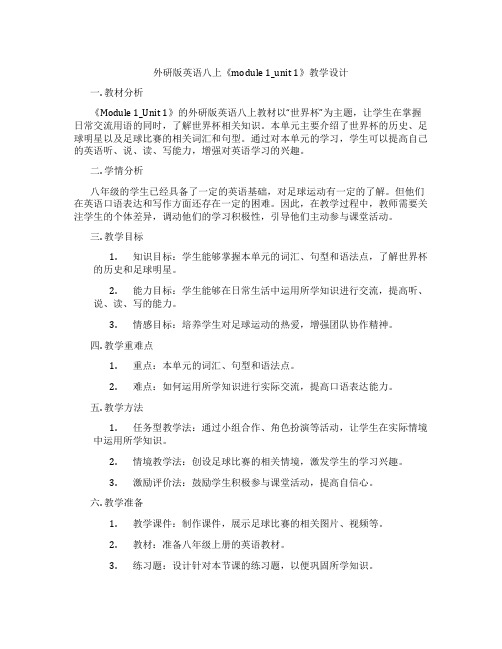
外研版英语八上《module 1_unit 1》教学设计一. 教材分析《Module 1_Unit 1》的外研版英语八上教材以“世界杯”为主题,让学生在掌握日常交流用语的同时,了解世界杯相关知识。
本单元主要介绍了世界杯的历史、足球明星以及足球比赛的相关词汇和句型。
通过对本单元的学习,学生可以提高自己的英语听、说、读、写能力,增强对英语学习的兴趣。
二. 学情分析八年级的学生已经具备了一定的英语基础,对足球运动有一定的了解。
但他们在英语口语表达和写作方面还存在一定的困难。
因此,在教学过程中,教师需要关注学生的个体差异,调动他们的学习积极性,引导他们主动参与课堂活动。
三. 教学目标1.知识目标:学生能够掌握本单元的词汇、句型和语法点,了解世界杯的历史和足球明星。
2.能力目标:学生能够在日常生活中运用所学知识进行交流,提高听、说、读、写的能力。
3.情感目标:培养学生对足球运动的热爱,增强团队协作精神。
四. 教学重难点1.重点:本单元的词汇、句型和语法点。
2.难点:如何运用所学知识进行实际交流,提高口语表达能力。
五. 教学方法1.任务型教学法:通过小组合作、角色扮演等活动,让学生在实际情境中运用所学知识。
2.情境教学法:创设足球比赛的相关情境,激发学生的学习兴趣。
3.激励评价法:鼓励学生积极参与课堂活动,提高自信心。
六. 教学准备1.教学课件:制作课件,展示足球比赛的相关图片、视频等。
2.教材:准备八年级上册的英语教材。
3.练习题:设计针对本节课的练习题,以便巩固所学知识。
七. 教学过程1.导入(5分钟)利用足球比赛的视频或图片,引导学生谈论足球运动,激发学生的学习兴趣。
2.呈现(10分钟)教师展示本节课的主要词汇和句型,如“世界杯”、“足球明星”等,并通过情境教学法,让学生在实际情境中感知和理解这些词汇和句型。
3.操练(10分钟)学生分组进行角色扮演,模拟足球比赛中的对话,巩固所学知识。
教师巡回指导,纠正发音和语法错误。
外研版八上英语 Module 10 The weather UNIT1 It might snow
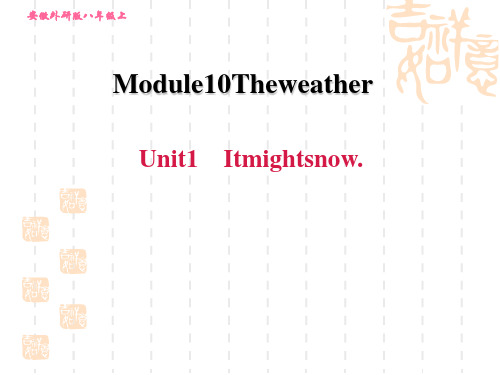
Almost(几乎) everyone______33whattheweatherman (气象播音员) willsay. 33. A. hearsB. listens C.DhearsfromD. listensto
Buthedoesn’talways______34uswhatwewant, andsometimeshemakesmistakes(犯错误). Stillheusually______35closertobeingcorrect(正确)
B. How’stheweatherthere?
there?
C. I’mgoingtothesupermarket.
C. I’m going to the
D. What’sthetemperaturenow, supermarket.
MuCm?
D. What’s the temperature
E. Isittrue?
Hewon’tbelieveanythingelse. Whenfriendshaveapicnic, theyhopetheweatherisgoingtobefineandtheycan_____32unde rthebluesky. 32. A. sitsB. sittingC. sitD. tosit
I’mgoingtGothesupermar ket. D.
B What’sthetemperaturen ow, Mum? E. Isittrue? F.
A. I wish Mike were here. B. How’s the weather
there? C. I’m going to the
能力提升练
31 A
36 D
32 C
外研版八上模块十教案

外研版八上模块十教案模块十《The power of nature》教案。
Unit 1 Natural disasters。
教学目标。
1. 了解自然灾害对人类的影响。
2. 学习描述自然灾害的词汇和表达方式。
3. 提高学生的阅读理解能力和写作能力。
教学重点。
1. 自然灾害的表达和描述。
2. 阅读理解能力的提升。
教学难点。
1. 如何对自然灾害进行描述和表达。
2. 如何提高学生的写作能力。
教学准备。
1. 教师准备PPT和教学素材。
2. 学生准备课本和笔记。
教学过程。
Step 1 Warm-up。
教师可以通过图片或视频展示一些自然灾害的场景,让学生感受到自然灾害的破坏力和影响。
然后让学生谈谈自己对自然灾害的看法和感受。
Step 2 Presentation。
教师通过PPT或板书的方式,向学生介绍一些自然灾害的词汇和表达方式,如earthquake, flood, hurricane, tornado等。
并且通过例句和图片让学生了解这些自然灾害的特点和破坏力。
Step 3 Practice。
教师可以设计一些练习题,让学生通过填空、选择题等方式来巩固自然灾害的词汇和表达方式。
同时,可以让学生分组讨论,用自己的话语来描述一种自然灾害,让学生在实际运用中加深对自然灾害的理解和记忆。
Step 4 Reading。
教师选择一篇关于自然灾害的文章,让学生进行阅读,并且设计一些问题来引导学生对文章进行理解和分析。
同时,教师可以让学生进行小组讨论,分享自己对文章的理解和感想,提高学生的阅读理解能力和表达能力。
Step 5 Writing。
教师可以让学生通过阅读文章和讨论,来写一篇关于自然灾害的作文,让学生在实际写作中提高自己的表达能力和写作能力。
同时,教师可以对学生的作文进行批改和指导,帮助学生提高写作水平。
Step 6 Summary。
教师对本节课的内容进行总结,让学生对自然灾害的表达和描述有一个清晰的认识,同时也对学生的阅读理解能力和写作能力进行总结和提升。
外研版英语八年级上册课文翻译

Module 1 Unit 1詹姆斯老师:同学们,欢迎大家返校学习。
今天,我们要讨论一下学习英语的好方法。
准备好了吗?谁能提些建议?玲玲:在课堂上我们应该一直说英语。
詹姆斯老师:好!让我们尽量多说英语吧。
大明:为什么不把错误记在笔记本上呢?詹姆斯老师:这是一个好主意。
别忘了将正确答案记在错误的旁边。
还有什么建议?玲玲:每天拼读并大声地朗读新单词也是一个好办法。
詹姆斯老师:多谢玲玲。
听英语广播你们觉得怎么样?大明:是的,听英语广播对我们的发音也有好处。
但是生词太多了。
詹姆斯老师:你们并不需要听懂每个单词,只要能听懂关键词和主要内容就可以了。
大明:阅读也是这样。
英语故事很有趣。
通过阅读,我能更多地了解世界。
玲玲:我想写作也同样重要。
为什么不找些英国笔友呢?我们可以给他们写写信。
詹姆斯老师:太好了!我同意你的观点。
Unit 2问与答把你的问题发给语言医生黛安娜。
很多学生请我就如何提高英语水平给出建议。
下面是他们提出的三个基本问题第一个问题是关于如何理解英文电影和英文歌曲的。
湖北的李浩写道:“我喜欢看英文电影,听英文歌曲,但我听懂得不多。
我该怎么办呢?”看电影、听歌曲是很好的英语学习方式。
多看多听几遍,然后猜猜生词的意思。
每一次你都将学到新的东西。
我还建议你和朋友谈一谈看过的电影或听过的歌曲。
第二个问题是关于口语的。
吉林的王帆写道:“我们学校有一位来自美国的外教。
但是我比较腼腆,不敢和她说话,我该怎么办?”你可以说:“嗨!你好!”“你喜欢中国吗?”这些都是发起话题的好方式。
说话之前,对她笑一笑。
记住:别害羞,多尝试。
第三个问题是关于词汇的。
安徽的张磊写道:“我把生词写下来,但是很快就忘记了,我怎么才能记住这些生词呢?”别担心。
忘记生词是正常的!我建议你每天在纸上记下四五个单词,放在房间里。
看到就念一念,并尽量运用这些单词。
Module 2 Unit l托尼:嗨,大明,周末过得怎样?大明:挺不错!我去了深圳。
- 1、下载文档前请自行甄别文档内容的完整性,平台不提供额外的编辑、内容补充、找答案等附加服务。
- 2、"仅部分预览"的文档,不可在线预览部分如存在完整性等问题,可反馈申请退款(可完整预览的文档不适用该条件!)。
- 3、如文档侵犯您的权益,请联系客服反馈,我们会尽快为您处理(人工客服工作时间:9:00-18:30)。
外研版八上英语Module 10 The
weather
Unit 1
Good evening, everyone! Here is the weather report in some cities around the world in twenty hours.
In Moscow, the temperature is between minus ten and minus three degrees. You can skate on the thick ice. It will be snowy and windy tomorrow morning and it might snow heavily tomorrow afternoon.
Beijing is sunny. It is neither too cold nor too hot. However, the weather will probably be terrible because a big storm is coming in ten hours.
The temperature in New York is between 22 degrees and 28 degrees. There is much cloud this evening. There might be a shower. It will still be cloudy or rainy tomorrow morning. But it will be sunny in the afternoon.
Sydney is rainy and wet tonight. Everyone wishes it could rain heavily because it is hot and dry for a long time.
1. cloud n.云;云雾
2. shower n.阵雨
【新义:n.& v.淋浴】
3. snow n.雪v.下雪
4. storm n.暴风雨
5. cloudy adj.多云的
6. rainy adj.多雨的;下雨的
7. snowy adj.多雪的;下雪的
8. sunny adj.晴朗的
9. windy adj.多风的;刮大风的
10. skate v.滑冰
11. thick adj.厚的
【新义:adj.茂密的;浓密的;黏稠的】
12. ice n.冰
13. joke v.说笑话;开玩笑n.笑话;玩笑
14. might v.aux.可能;也许
15. temperature n.温度
16. minus adj.负的;零下的
【新义:prep. 减;减去】
17. degree n.度;度数
【新义:n.程度】
18. although conj. 然而;尽管
19. wet adj.下雨的;湿的
20. neither adv.(某人或某事物)也不
21. terrible adj.使人烦恼的;可怕的
22. wish v.但愿;希望
【新义:n.希望;祝愿】
23. probably adv.或许;可能
1. cloud n.云;云雾→cloudy adj.多云的
2. snow n.雪v.下雪→snowy adj.多雪的; 下雪的
3. rain n.雨;雨水v.下雨→rainy adj.多雨的;下雨的
4. sun n.太阳→sunny adj.晴朗的
5. wind n.风→windy adj.多风的;刮大风的
6. probable adj.或许;可能→probably adv.或许;可能
1. between… and… 在……和……之间
2. quite a lot相当多
3. as well也
4. come on 快点儿
5. at least至少
1. 而且还是阴天,所以可能会下雪。
An d it’s cloudy too, so it might snow.
2. 这儿的冬天比英国(的冬天)冷。
Winter is colder here than in England.
3. 贝蒂,美国冬天的天气怎么样?
What’s the weather like in America in winter, Betty?
4. ——但我不喜欢阵雨或刮风的天气。
——我也不(喜欢)。
—But I don’t like showers or windy weather.
—Me neither.
5. 我希望我现在在澳大利亚。
I wish I were in Australia now.。
